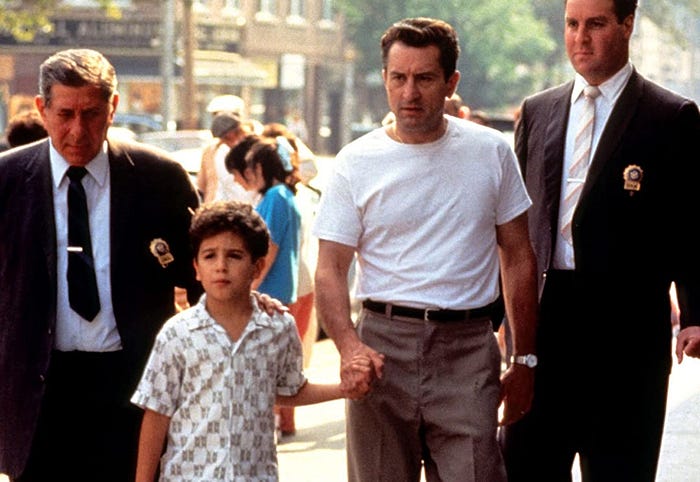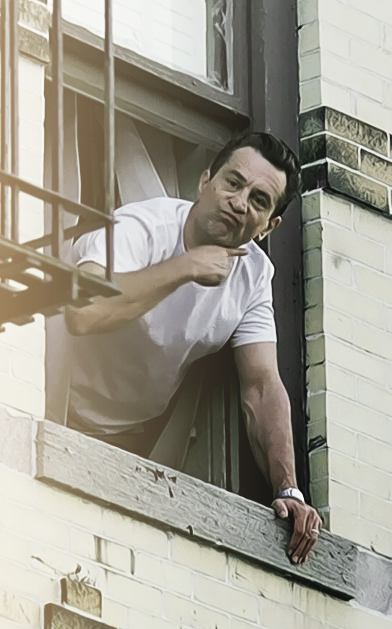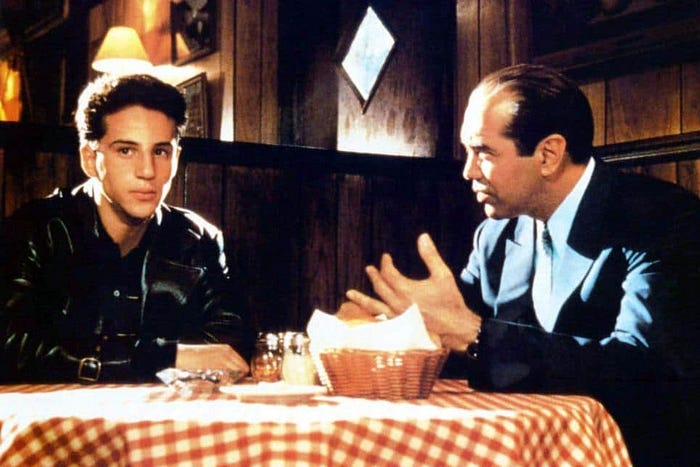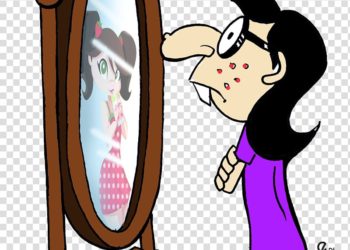Synopsis of A Bronx Tale (1993)
I like to think of A Bronx Tale (1993) as a mafia movie with a soul; a coming together of two different spheres of life in the person of Calogero Anello. The inciting incident of the movie kicks off on a sunny day in 1960. Young Calogero (Francis Capra)- while sitting on his stoop- witnesses his idol, the Mafia Boss, Sonny (Chazz Palminteri) shoot a man over what seems to be a fight about a parking space. Sonny looks the young boy dead in the eye, as if willing him to erase all memory of what he had just witnessed. Calogero’s father, Lorenzo (Robert De Niro) immediately frisks him into the house shortly before the police arrive.

Unfortunately, the police believe the boy knows something. They line up a couple of suspects and ask young Calogero to identify who the shooter was. In Belmont, the worst thing you could be was a rat. By adhering to the code of silence, Calogero not only proved he was going to be a man of substance but also showed that true Italian blood ran in his veins. This singular action earns him Sonny’s affection.
Impressed by Calogero’s actions, Sonny offers Lorenzo a job “dropping numbers” for a weekly pay of $150. Ever the upstanding man, Lorenzo turns it down. Though he and his child saved Sonny, he wants nothing further to do with him. Unlike his father, Calogero is enamored by Sonny and wants everything to do with him. Sonny treating him like an adult and the preferential treatment everyone gives him because of Sonny makes the relationship more appealing. Thanks to Sonny, Calogero becomes “C” and Sonny his surrogate father. Calogero starts working in Sonny’s bar and earns money throwing dice and serving drinks. Lorenzo discovers the $600 Calogero earned working for Sonny and returns it despite Calogero’s pleas. Lorenzo warns Sonny to stay away from his son and reiterates to Calogero the strength of a working man.
Eight years later, C is 17 now, and closer than ever to Sonny. His father is not thrilled about this, but he treats the situation with grudging resignation. Sonny tells C that to be a complete man, he has to get two educations: one from school and one from the streets- and C does exactly that. Though it might not seem like it at first, C synthesizes the knowledge he gets from his father and Sonny, and this separates him from his peers at the Deuces Wild Social Club. Asides from being the voice of reason his friends never listen to, he is introspective, compassionate, and not as impulsive as his friends.
The first climax of the movie kicks off when Calogero sees and falls for an African-American girl called Jane Williams (Taral Hicks) on his father’s bus. The attraction between the two is problematic, given the frictions between the Negro and Italian communities. Nevertheless, a tentative relationship blooms between the two. Understandably, C is worried about what “his people” would think of him going out with a colored girl. While his father believes it is advisable to date and marry within one’s community, Sonny encourages him to see his attraction with Jane through and lends him his car.
Secure in the knowledge that Jane might just be “one of his great ones”, he prepares for his date. Shortly before his date, his friends attack a group of black boys cycling through their neighborhood, despite C’s attempts to stop them. C heads off to his date with Jane. Things go south when C discovers one of the attacked boys is Jane’s brother, Willy (Sobe Bailey). Willy insists Calogero is the one that beat him up and Jane believes him. Frustrated, C calls them both the N-word and storms off. He returns Sonny’s car and slinks off home. Lorenzo had seen C driving Sonny’s car, and he confronts him about it. An argument ensues, hurtful words are said and C storms out.
Downstairs, C is confronted by Sonny and his crew, who had just discovered a bomb in Sonny’s car. C tearfully vows his unwavering loyalty to Sonny. He then reminds Sonny of the fact that he sees him as a father. Sonny lets him go and shortly afterward, his friends pick him up. The black boys egged the Italian boys’ joint in retaliation for the beating. The young Italian boys prepare for a reprise attack featuring some flaming Molotov cocktails. The second climax of the movie takes place in the car. C is uncomfortable with the current trajectory of things, however, he doesn’t know how to extricate himself from the situation. While he felt what they were about to do was wrong, he wanted the others to see him as a man with heart- and a man with heart sure as hell never pulled away from situations like this.
As luck would have it, Sonny decided for him and pulled him out of the car. He then warned the boys to stay away from C. Calogero returns to Belmont where someone informs him Jane came looking for him. Jane apologizes for what happened earlier. Willy finally told her the truth of how Calogero tried to save him. C remembers his friends, the Molotov cocktails and the planned attack and the duo rush off to stop them. The young boys attack the black neighborhood. In a ghastly twist, a black shopkeeper throws a flaming Molotov cocktail into the Italian boys’ car. The boys die in the ensuing explosion.

C is shaken by this. By all rights, he should have been in that car. If not for Sonny he would be burnt to a crisp, lying in a body bag next to Slick (Joe D’Onofrio) and Mario (Louis Vanaria). Overwhelmed by gratitude, C rushes off to the bar to thank Sonny for saving his life. Unfortunately, before C can get to him, Sonny is assassinated by the son of the man he shot eight years ago. Sonny’s funeral is an elaborate affair filled with extravagant funeral wreaths and well-dressed dignitaries. However, one thing is certain: everyone had moved on. The movie ends on a pensive note with C mulling over the lessons he learned from the two prominent men in his life.
Analysis of A Bronx Tale (1993)
Calogero.
The name reminds me of the golden sun glinting off the shiny blue-green surface of the Mediterranean sea- and the bearer of the name is just as delightful. When I think of the ballsy Calogero, I remember what a friend of mine that grew up in a rough city used to say about herself: Made in the streets but not made for the streets. This defines the essence of who Calogero Anello is. As we see throughout A Bronx Tale (1993), Calogero is made from different stuff. This may or may not be because of the duality of the upbringing he had.
A Bronx Tale (1993) was originally written for stage by Chazz Palminteri who was Calogero in actual life but plays the charismatic but dangerous Sonny in the movie. With characters like Jerry Coffee Cake (Dave Salerno), whose face is as stony as Sicily, Jojo the Whale (Fred Fischer), a literal force to be reckoned with and Eddie Mush (Eddie Montanaro), whose ill-luck would sadden even the devil, the movie leaves you with a feeling of anemoia.
Films rarely come fully made. However, with the endearing ease that this movie guides us through laughter, anger, suspense, love, and tears, it is safe to say A Bronx Tale (1993) is one of those rare ones. While I am an avid fan of all things Mafioso, I have to say I love how this film trades the quintessential, gunshot-and-blood-filled mafia plot for a more didactic one. This, in no little way, makes the movie memorable and relatable.
With his boyish charm, deep talks, and hard edges, Sonny reminds me of Astorre Viola, the main character in Mario Puzo’s Omerta. Throughout the movie, one cannot help feeling there is more to Sonny than the murky path he chose. Unlike his crew, he seems learned and is quite principled and levelheaded. Though they might seem as different as night and day at first glance, Lorenzo and Sonny were more alike than they both knew. Their love for C and desire to see him become the best version of himself was one of the recurring themes of the movie.
From extracting just the right amount of emotion in the movie, Robert De Niro pulled a cinematic feat with A Bronx Tale (1993). This exploit becomes more astounding when you realize he was also an actor in the movie he was directing. The film is rich with themes and lessons that are still relevant almost 28 years after the movie first aired.
Themes in A Bronx tale (1993)
Hard Work is Good Work “It don’t take much to pull a trigger but try and get up every morning day after day and work for a living. Let’s see him try that and we’ll see who’s the real tough guy. The working man is the tough guy. Your father is the tough guy…”
This statement by Lorenzo is powerful, dynamic, and still applicable today. At different points in the movie, C/Calgaro calls the working man a sucker, an ideology he no doubt picks up from Sonny. However, the working man is anything but a sucker.
Anyone can take the criminal path and excel at it. But taking the honest route, dogging it out, and putting the pedal to the metal especially on those days you don’t feel like it takes a different kind of strength. Staying on the straight and narrow and working towards success as opposed to taking short cuts can be one of the hardest things to do, especially when others are taking those short cuts happily. We see this a lot today where speed culture forces a lot of people to dabble into less than honest ventures in a bid to make it. No matter what society says or encourages, the honest, hardworking man is a true hero.
Do As I Do versus Do As I Say

Parenting is hard AF. You can do everything right and still fuck it up royally.
It is what it is.
This particular theme is the first of two parenting lessons in A Bronx Tale (1993).
Human beings are naturally very good advisers. It is both a blessing and a curse. However, most of us suck at taking our own advice. This is why we advise people to leave toxic relationships while sitting pretty in the most toxic relationship of the millennium and encourage people to open their hearts up to love while barricading ours and hissing at any unfortunate human brave enough to approach. Things become stickier when you are a parent and are expected to always do as you say.
Kids learn through observation. A great majority of the time, they do what you do and not what you say. Thus, it becomes important to follow your words with actions even when it seems difficult. When Lorenzo found the $600, it would have been easy to slap Calogero on the wrist and “confiscate” the money. No one would fault him for that. After all, like his wife, Rosina (Kathrine Narducci) said, they needed it. However, Lorenzo wanted to teach Calogero an important life lesson, and in doing that, he also showed the importance of matching words with actions.
Train a Child in The Way He Should Go…
…and when he is old, he will do what the hell he wants to do.
This might sound painful to a lot of parents, but being a good example and showing your kids the right path to follow doesn’t guarantee they would follow that path. I like to think of parenting as giving a child options over many years. Essentially (good) parenting says, “I know society says this is what you should do, but I have been there and I know it doesn’t. This other thing works and I think you should stick to it…”
It is left to the child to pick which one (s)he wants- and unfortunately, they don’t always pick right.
Despite Lorenzo’s advice and warnings, Calogero clung to Sonny like stink on poop and got mixed up with the wrong gang. On closer inspection, we realize that that interaction might have led to Calogero being killed if the bomb had detonated when he was with Jane. It takes Sonny’s death to get C to rethink hanging out at the bar.
The Yin-Yang Effect

The philosophy of yin-yang believes in the dualistic nature of life. It is a belief that something can house its antithesis. This perfectly describes Sonny. Sonny is a walking paradox. Yes, he was a gambler, a criminal, and a killer, but some of his actions and advice don’t fit the criminal mold. A perfect example is when C tells Sonny of Louie Dumps ( Max Genovino) trying to evade paying him the $20 he loaned him two weeks earlier.
Sonny surprised C- and me- by telling C to forget about the money. C didn’t even like Louie to begin with. The way Sonny saw it, C got rid of Louie for the cheap sum of $20. Sonny pulls another one out of the hat with the test he asks Calogero to give Jane. I was expecting it to be something as misogynistic and irritating as Mario’s test, but it turned out to be pretty wholesome and sweet. From encouraging C to stay in school down to telling him to ditch his no-good friends, Sonny proves there is more to him than his terrible reputation.
Peer Pressure

Be it doing something that didn’t feel right or subscribing to beliefs that run parallel to what we know to be true, our actions and inactions have, at some point in time, been influenced by our friends- and C was no different. One of C’s major flaws was his strong desire to belong and please his friends.
For most of the movie, he was two people: C, the “man with heart” and the real Calogero. The latter was the person he truly was and the person he was around Sonny. This duality of character and inability to stick to what he knew to be right would have gotten him killed if Sonny hadn’t pulled him out of that car. It pays to have a mind of your own, to be willing to go against the grain. Yes, it might not make you popular. Heck, your friends might not like you for that, but who cares?
Love Is Color-Blind
Cliche? Definitely
But the truth doesn’t stop being true no matter how cliche it sounds.
Attraction is determined by a set of arbitrary and random rules. While we can influence how we love and express love, we cannot choose who we love. When C is hit by the coup de foudre, one thing is certain: things will get messy.
And it did.
From having to hide his attraction to Jane from his friends, evil glares from black boys when he walked Jane home, and the Italian boys beating up the black cyclists, it was obvious C’s and Jane’s love was going to be more costly than your everyday same race relationship.
The Hate You Give
Like a living thing, hate feeds and grows. One thing is obvious from the start of the movie: Calogero’s friends don’t like Negros. While Calogero is largely unbothered about them, his friends have a strong dislike for them. This dislike becomes an all-consuming hatred by the time the boys are 17. This hate triggers a series of cascade events that lead to the boys paying the ultimate price.
Sometimes, I sit back and think of what would have happened to C and his “street cred” if his friends had found out he was “fraternizing with the enemy.”
Power Can Be Isolating

When it comes to isolation, COVID-19 has nothing on power. It’s just like that song from Disney’s Fox and the Hound 2 (2006) goes:
It’s lonely at the top When the lights go down And the cheering stops You got no real friends No place to call home…
It is said that the loneliest time in a man’s life is when he is cold and dead in his grave. But as we can see in the plot of A Bronx Tale (1993), one can experience loneliness way before death. For all his charisma, money, insightful life advice and the love people had for him, Sonny was a very lonely man. He had so many enemies he lived his life distrustful of everyone and continuously looking over his shoulder. He was alone even when he was surrounded by people, merriment, and all the love in the world. Ironically, at death, Sonny was not alone. He was with the one person that truly loved, cared for, and respected him.
On Being Loved and Being Feared

While Sonny and Lorenzo are both bosses in their own right, one major distinction exists between them: Lorenzo is loved but Sonny is feared. Initially, young Calogero believes everyone loves Sonny- and we can see why he thinks so. Sonny is fun, charming, and an interesting personality. Everyone “loved” him and wanted to be in his good books. This was why Phil the Peddler (Tommy A. Ford) and the rest started cozying up to Calogero, right?
Wrong
They did so because they knew it was more valuable to have Sonny as a friend than an enemy. Unlike Lorenzo, who was loved and respected for who he was, Sonny’s respect came from the fear everyone in his inner and outer circle had for him.
The Pain of Wasted Talent
The bulk of Lorenzo’s advice to C revolved around the pain of wasted talent. It doesn’t matter if a man has all the talents and potential in the world. What matters is how (well) he put them to use. This is one of the central messages of the movie. For all his charisma, intelligence and power, Sonny was wasted talent. If life hadn’t blown him in the direction he had gone, given his intelligence, circumspection, and magnetic personality, Sonny could have easily been a priest, a politician, or a philosopher. Unfortunately, all that talent and promise went to waste.
On the other hand, C’s friends (the young boys of the Deuces Wild Social Club) were a painful example of wasted talent. They went to waste even before they could accrue potential. While talking to C about the need to be his own man and thinking for himself, Sonny tells C that his friends would either be shot or end up in jail with the way they were going. The statement, though fatalistic, was the unadulterated truth and later proved to be prophetic given the horrible way the young boys died.
The Cyclical Nature of Life
Life is an ouroboros…
… or at least that’s what’s tenable in movies and the mafia world.
What goes around will come back around. We see it in the poetic justice of Sonny being killed by the son of the man he killed and C’s friends being killed by their secret weapon. Bearing this in mind, it thus becomes important to act according to the energy or outcome we hope to attract.
Verdict
Strength of the Plot- 9.5
Plot Progression- 9.0
Character Development- 9.8
Total- 9.4
Filled with relatable moments and tweet-worthy lines, A Bronx Tale (1993) is a 9 on a ten-point scale and a film that feels evergreen each time you watch it.
Originally published on Medium.
Like what you read? Check out Untangling the Roots of Texturism: Review of Bad Hair (2020) and The Root of All Evil: Review of Gold Statue (2019)








Comments 2